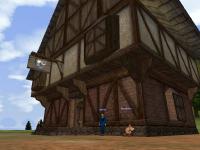|
|
|
Main News Forums Games Games Database Top 100 Release List Support Files Features Reviews Previews Interviews Editorials Diaries Misc Download Gallery Music Screenshots Videos Miscellaneous Staff Members Privacy Statement |
Random Dialogue: The Beat of a Different Swordsman The standard in combat design within Massive games is the Diku-MUD style hack and slash inherited by Everquest. Combat is a complex interaction between Armor Class, to-hit bonuses, equipment, weapons, and spells. In D&D and EQ the guts of the combat mechanic are wide open to examination. Every aspect of the system is visible, allowing players to conciously pick and choose the best way to get what they want out of the system. For those wanting maximum "tank" benefits, AC can be maxed out. For thieves and warriors, Damage per Second can be gained to get the most bang for your buck. Combat is also in "real-time", meaning that once combat is engaged the situation moves forward at a steady pace with no pauses. Usually combat also requires little input. Special moves can be used to increase damage at set intervals, but movement plays a minor role and there is a minimum of strategy once combat is engaged. First, I question the need to have the guts of the combat system exposed to the player base. Why, exactly, do all those numbers matter to the players? I understand that there is a certain segment of subscribers that will want to game the system as much as possible. For most folks, though, there is no reason to care about numbers. As long as their gear and abilities remain competetive with other players in their level range and they stay effective against monsters, what does it matter if their strength is 19 or 20? Final Fantasy XI has a level requirement for every piece of equipment. They display openly the mechanic parts of weapons and armor, but really there isn't a reason to do so. As long as you know that the level 15 sword is better than the level 10 sword, why do you have to be aware of the mechanics? City of Heroes deliberately obfuscates the numbers behind hero powers. The only math element displayed to players is the amount of damage done to enemies with each attack. Overall, I don't see a reason for even this much display of the combat math. In Star Wars Galaxies, emotes and chat are given a very prosiac spin through canned writing. The emotional flavour of social interaction is enhanced greatly by this approach. In between this prose, you're forced to read statements like "You shoot the bantha for 1005 points of energy damage". I'm no carebear, but I find the disparity a bit harsh. Why not hide the numbers behind similar prose, and integrate combat with the "story" that the chat and emotes tell. "Your shot hits the Bantha high on the shoulder, burning him badly" sounds quite a bit more interesting than the thing about energy damage. I also question the need for real-time combat. FPS' are a very popular genre, and it seems as if their popularity has caused the real time model to be viewed as expected. For someone who grew up on the turn based combat of the Final Fantasy series, I'm not sure I agree. Knights of the Old Republic is far and away one of the most successful games of recent memory, and it had no need for real time combat. The difficulties of adopting a turn based model to a MMOG are obvious. Joining combat would require some level of abstraction, possibly raising a small "combat area" via a visual cue when a character interacts with a monster. Other players entering the fray would also be a challenge. Turn based combat has a long and venerable history, though, and the possibilty of strategic fighting makes the challenges worth the rewards (IMHO). To be honest the real time combat that Final Fantasy XI uses is one of the major dissapointments I have with the game. It's nice to be talking about game systems again. Look to Random Dialogue columns every Monday for a dose of MMOG-design goodness. The next 10 days or so are going to be interesting times here at MMORPGDot, so make sure to check back with us on Wednesday to see what we're up to! |
|||
|
All original content of this site is copyrighted by RPGWatch. Copying or reproducing of any part of this site is strictly prohibited. Taking anything from this site without authorisation will be considered stealing and we'll be forced to visit you and jump on your legs until you give it back. |
||




